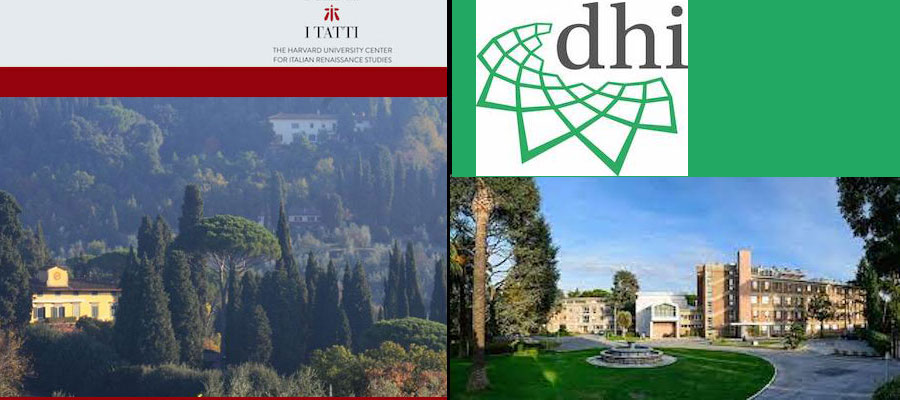I Tatti – The Harvard University Center for Italian Renaissance Studies and the German Historical Institute in Rome (Deutsches Historisches Institut in Rom) offer a joint residential fellowship for the 2022-2023 academic year. With this fellowship, I Tatti and the DHI Rom seek to stimulate and support increased scholarship on cultural exchange with and within the African continent during the period c. 1250-1750 by creating and promoting opportunities for cross-disciplinary collaboration, particularly between scholars from African regions and those working in European and North American institutions. The fellowship offers post-doctoral scholars working on African studies (or topics that closely consider Africa) a ten-month position to conduct historical research in Italy supported by two institutes with dynamic academic communities.
Fellows will spend five months (September 1, 2022 – January 30, 2023) in Rome at the DHI and five months (February 1 – June 30, 2023) in Florence at I Tatti. The fellowship is designed for scholars in fields related to the study of precolonial and colonial African history c. 1250-1750, including art history, the history of expressive cultures, musicology, economic history, intellectual, political, and religious history, as well as literature and languages. Preference will be given to advanced research projects that address the relationship between the African continent and the Mediterranean world during the early modern period, broadly understood historically to include the period from the 14th through the 17th centuries.
Eligibility
We welcome applications from scholars of all nationalities. Special consideration will be given to scholars from the African continent. Applicants must have their PhD certificate in hand by the time they apply. Applicants must be fluent in English, Italian, German, or French, and proficient in an additional one of these languages. It must be possible for Fellows to carry out most of their research with the resources available in the city where they are resident. The Fellow will be expected to carry out original research on the topic for which they have been awarded their fellowship. Priority will be given to applicants with no previous association with the two institutes.
Terms and details relating to the DHI
- Fellows will spend five months at the DHI Rom (September 2022 – January 2023).
- Fellows are required to spend their research period in Rome except for research-related trips, and to participate in and contribute to the activities of the DHI Rom. The Fellowship may not be held concurrently with another fellowship or award.
- The Fellow is responsible for obtaining health coverage with an Accident and Health insurance policy. The Fellow is responsible for obtaining a visa, permesso di soggiorno, and health coverage (and, if appropriate, for accompanying family members). The Fellow must determine if a visa is required and, if necessary, obtain one before travel.
- Fellows are given a space to work within the DHI for the duration of their stay. Fellows enjoy the use of the DHI library, archive, and collections.
Terms and details relating to Villa I Tatti
- Fellows will spend five months at I Tatti (February – June 2023), made possible by a generous grant from The Lila Wallace – Reader’s Digest Fund.
- Fellows may not take on any other obligations such as teaching positions, even part-time ones, during any part of their fellowship period. The Fellowship may not be held concurrently with another fellowship or award.
- This is a residential fellowship. Fellows must live in the Florence area, spend at least three days a week at I Tatti, and participate in and contribute to the activities at the Center.
- Fellows enjoy all the privileges of I Tatti, including use of the Biblioteca Berenson seven days a week and lunch with other Appointees from Monday through Friday. Fellows are offered a reserved desk or carrel in the Biblioteca Berenson.
- The Fellow is responsible for obtaining a visa, permesso di soggiorno, and health coverage (and, if appropriate, for accompanying family members). The Fellow must determine if a visa is required and, if necessary, obtain one before travel.
